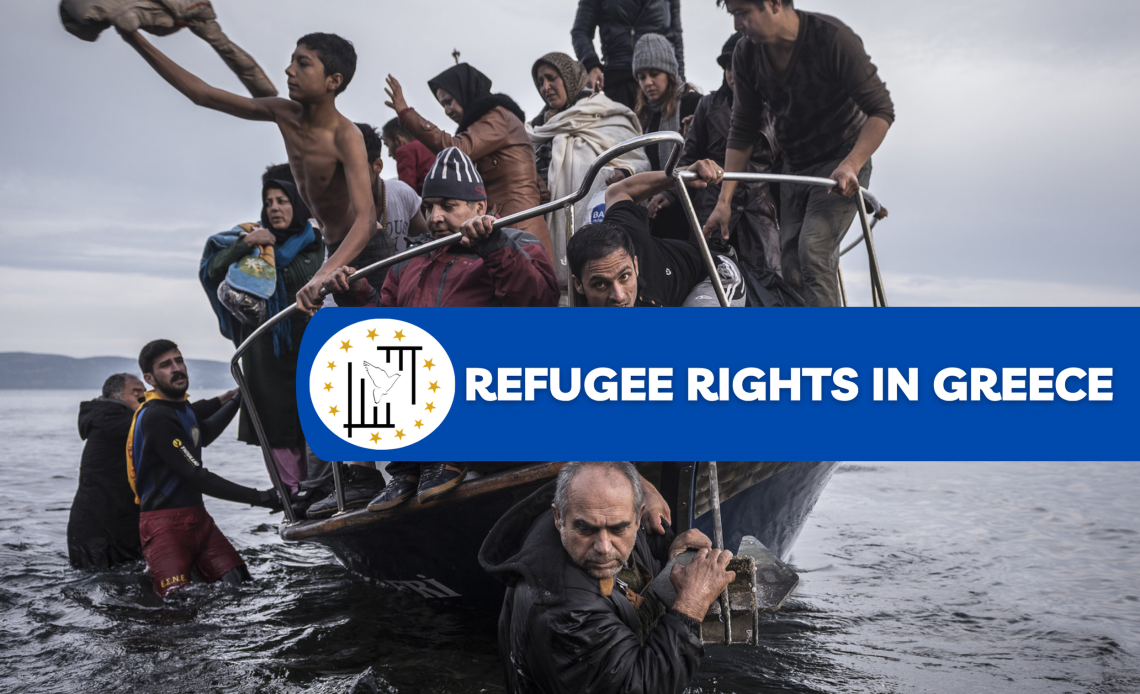SUBMISSION OF ASSEDEL FOR THE UN UNIVERSAL PERIODIC REVIEW FOR GREECE, 52nd SESSION OF THE UPR WORKING GROUP, May 2026
Over the past decade, Greece has become a primary entry point into the European Union for refugees and migrants, particularly along the Eastern Mediterranean route. Despite its strategic importance, Greece continues to face serious challenges in ensuring humane reception conditions, fair asylum procedures, and respect for the principle of non-refoulement.
Current Situation
According to UNHCR and Eurostat, Greece received around 50,000 asylum applications in 2023, placing Greece among the top EU receiving countries relative to its population size. More than 60,000 refugees and asylum seekers currently reside in the country. While many live on the mainland, severe overcrowding persists in the Aegean islands of Lesvos, Samos, Chios, Kos, and Leros.
Detention Conditions
Greek detention and reception centres have been repeatedly criticized by the Council of Europe, UN bodies, and NGOs for inhumane and overcrowded conditions. Reports highlight unsanitary facilities, inadequate healthcare, and psychological distress among detainees. Vulnerable groups—particularly women, children, and persons with disabilities—face heightened risks of violence and neglect.
The European Court of Human Rights (ECtHR) has condemned Greece for violations of the prohibition of ill-treatment, including a 2023 ruling concerning conditions in the Samos “hotspot.” Administrative detention can last up to 18 months, often in prison-like facilities. In some cases, unaccompanied minors are held in so-called “safe zones”, often inaccessible to NGOs or independent monitors.
Asylum Procedures and Closed Controlled Access Centres (CCACs)
Despite procedural reforms, asylum seekers still face long delays, limited access to information, and growing hardship due to cuts in financial aid and forced evictions from state accommodation.
The transition of former “open” Reception and Identification Centres (RICs) into Closed Controlled Access Centres(CCACs)—on Samos, Leros, and Kos—has further restricted asylum seekers’ freedom of movement. These high-security facilities, financed by the EU, are fenced, surveilled, and located far from local communities. Although presented as “modernized” structures, independent investigations describe them as “prison-like”, with poor sanitation, unreliable access to water and healthcare, and minimal psychosocial support.
The geographical limitation policy, which prevents asylum seekers from leaving the islands, aggravates isolation and violates the right to liberty and family life.
Children and Other Vulnerable Groups
Despite legal safeguards, unaccompanied and separated minors are still frequently held in restrictive “safe zones.” As of early 2025, over 8,000 children were in Greece’s asylum system, including more than 2,300 unaccompanied minors, mostly boys aged over 15. Overcrowding, inadequate guardianship, and lack of education or healthcare persist.
The ECtHR has repeatedly ordered Greece to protect children exposed to violence, inhuman treatment, and prolonged confinement. Although a national guardianship system was introduced in 2023, staffing remains insufficient, leaving many minors without adequate representation or care.
Pushbacks and Non-Refoulement
Pushbacks to Turkey —the unlawful return of migrants without access to asylum procedures—remain one of the gravest human rights concerns in Greece. Numerous credible reports describe systematic collective expulsions accompanied by violence, theft, and abandonment at sea.
In A.R.E. v. Greece (2025), the ECtHR found that Greece engaged in a “systematic practice” of pushbacks, violating the prohibition of torture and the right to an effective remedy. The Court also criticized Greece’s designation of Turkey as a “safe third country” for certain nationalities, a policy that exposes asylum seekers to chain refoulement and serious human rights risks.
ASSEDEL’s Recommendations
In light of the above, ASSEDEL calls on Greek and European authorities to:
- End all forms of ill-treatment of refugees and asylum seekers, ensuring independent monitoring and accountability.
- Train law enforcement and administrative officers to prevent pushbacks and guarantee impartial investigations of violations.
- Revise “safe third country” policies to align with international refugee and human rights standards.
- Improve reception and detention conditions, ensuring humane treatment and access to healthcare, sanitation, and psychosocial support.
- Strengthen protection for unaccompanied minors, including education access, guardianship, and an end to prolonged detention.
- Facilitate integration through language learning, vocational training, healthcare, and labor market access.
- Remove barriers to NGO access and ensure free humanitarian monitoring, legal aid, and rescue operations.
Katherine Sfendeles
For the full report, click the link here and learn more

